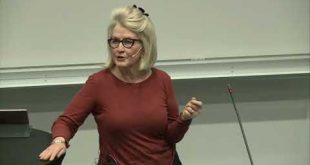I was interviewed by Martin Sandbu about the nature of money, in particular the importance of borrowers to the creation of money. A video was filmed at Bank Job, a wonderful charity dedicated to a) promoting understanding of money, b) cancelling the debts of the people of Walthamstow and c) using art to both advocate and fundraise. A link to their website is included here. Ann being interviewed by Daniel Edelstyn [embedded content] Related Posts
Read More »Overthrowing capitalism: Ann Pettifor vs Christian May
Daily Politics 24 May 2018 I rotate uploads between my three YouTube channels: for more like this search for: "Still Incorrigible" & "Incorrigible Forever" You can also view my blog here: https://imincorrigible.wordpress.com/ IMPORTANT NOTICE: UPDATE: 1/10/17 - due to the pressure of exams through October & November the daily upload of multiple news items will cease with immediate effect. Occasional clips of significant importance may be uploaded, but not in the usual quantity. 21/9/17 -...
Read More »Is it unreasonable to blame bankers/rentiers for the rise in populism?
At the April Rethinking Economicsconference in Oslo I pointed out that western politicians and economists are repeating policy errors of the 1930s. The pattern of a global financial crash, followed by austerity in Europe and the UK, led in those years to the rise of populism, authoritarianism and ultimately fascism. The scale of economic and political failures and missteps led in turn to a catastrophic world war. Today that pattern – of a global financial crash, austerity and a rise in...
Read More »Speech to the Rethinking Economics Conference, Oslo
On Friday, 13th April, 2018 I addressed the Rethinking Economics Conference…This is the You Tube link to the event… [embedded content] Related Posts
Read More »On tectonic plates, the economic system and the economics profession
It is my view that the greatest weakness of economics is the habit of drawing, or encouraging politicians to draw, macroeconomic conclusions from microeconomic reasoning (“the government budget, like a household budget, must balance”). This weakness is endemic within the profession. It is caused by the deliberate neglect of macroeconomics, including shameful neglect of Keynes’s monetary theory and policies; and by the dominance of microeconomics. Such skewed dominance is not accidental....
Read More »Why the Bank of England should not raise the Bank Rate
I wrote this post on the 21st April, 2018, for PRIME. “There are a significant number of households that are in so deep that the slightest sign of rough weather could see them in over their heads,” said Jonathan Davidson, one of the FCA’s directors of supervision. Given these imbalances, the biggest danger facing the British economy is this: at their meeting in May the Monetary Policy Committee of the Bank of England is very likely to raise rates – despite a warning from the governor...
Read More »Interview with New Zealand’s biggest business website
On the 15th April, this year, I visited New Zealand at the invitation of the Institute of Directors, to address 600 CEOs at their annual meeting. This is an interview given to the journalist Rob Stock in which he asked about the possibility of another financial crisis. Related Posts
Read More »Interview with Wallace Chapman of New Zealand Radio
At the invitation of New Zealand’s Institute of Directors, I recently visited Auckland. I was there to address the IoD’s annual gathering of 600 CEOs..and on the side did this interview with NZ’s equivalent of the BBC, for a Sunday Talk Show with popular host, Wallace Chapman. It was good to be given fully 20 minutes to address a largely non-economist audience. Related Posts
Read More »What is money? With Ann Pettifor
What makes money different from other assets? And how can our understanding of money prevent financial crises and promote prosperity? Talk at Rethinking Finance, Oslo April 13th. With Ann Pettifor, PRIME Economics and Bjørn Skogstad Aamo, former head of The Financial Supervisory Authority of Norway. Moderated by Roman Eliassen, Rethinking Economics Norway
Read More »From Prospect Magazine: there can never be a market in money
Prospect magazine’s April 14, 2018 edition ignited a debate between orthodox and heterodox economists. It also included a page titled: In my contribution I tried to explain the nature of money. Not sure I succeeded. Anyway, here it is: “Unlike the prices of bitcoins or gold, the price of money is not determined by the market forces of supply and demand. That’s because money is not a commodity, but a social construct: “a promise to pay” to quote Joseph Schumpeter. So money’s price—the...
Read More » Ann Pettifor: Debtonation
Ann Pettifor: Debtonation




